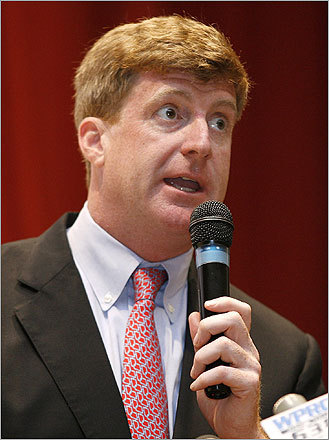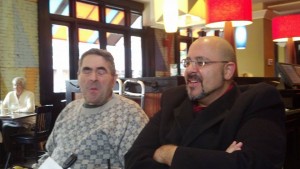The youngest son of Edward M. Kennedy has often been criticized as a lightweight Congressman who gets away with things other people would get arrested for. But the author salutes him anyway. Here’s why.
Patrick Kennedy, the youngest child of the late Sen. Edward M. Kennedy, announced yesterday that he won’t be running for re-election to the Congressional seat he has held since 1995.

Some will tell you it’s just as well. The Congressman, after all, hasn’t done much except for living off his family name and crashing cars into roadside barriers while high on narcotics. That’s often what I hear from my more conservative friends, who hate everything having to do with the Kennedy name.
Stew Milne/AP Photo
But as someone recovering from OCD, depression, a binge-eating disorder and other addictions, I have plenty of reason to defend this man.
In this book, Patrick is described as a spoiled kid who has accomplished nothing in Congress other than repeatedly winning re-election. He’s described as someone who blindly follows the Democratic leadership.
Some of that may be true. But Patrick has done some courageous service for those who suffer from mental illness.
Kennedy has been open about his own struggles with bi-polar disorder and the addictions that go with it. He has been in and out of addiction treatment centers and once noted how his addictive behavior could latch onto anything from pain medication to something as simple as cough medicine.
What’s more, he did one of the hardest things people like us can do: He lived in the spotlight as a public servant, where critics can be cruel and a lot of people like to hate the Kennedys just for the hell of it.
Patrick has carried a lot of pressure being a Kennedy. There’s the pressure to match his father’s towering legislative record and live up to the legendary stature of his uncles.
Some would have dropped to the floor long ago, curled in a fetal position, over the pressure. Some would not have survived. One of Patrick’s cousins, David Kennedy, one of RFK’s sons, didn’t survive the battle with the demons. He died of a drug overdose in 1984.
RFK Jr. also struggled with addiction. So did Christopher Kennedy Lawford, who wrote an excellent book of his own on the subject: “Symptoms of Withdrawal: A Memoir of Snapshots and Redemption.”
I loved Lawford’s book for a variety of reasons. He recounted his sordid tale with humor and was brutally honest about something addicts are all to aware of: When you quit the thing you’re addicted to, it doesn’t automatically turn you into a good person.

In fact, recovering addicts often become big jerks before they find their footing. They’re learning how to behave in public without being drunk or high. A deep depression often sets in because years of abuse leaves the brain with deep chemical imbalances that hit you like a brick to the head once the booze, food or narcotics exit the picture.
Patrick has dealt with all of these realities and still carried on in public service.
He continued to show up for life when life was at its most unbearable.
It gave people like me a little inspiration when we needed it most. So as Patrick prepares to exit the public stage and embark on a new life, I thank him for his service and wish him the best.
It’s easy for people to pass judgment on him for his flaws.
But people who do so often forget about their own flaws.
None of us are truly without sin. But we like to cast the first stones anyway.


